
Do you have a cold or the flu?
You feel a tickle in your throat, and then a headache coming on. You start to sniffle or sneeze, and suddenly you feel really tired. You know you’re coming down with something — but is it a cold, or do you have the flu? (Think you may have COVID-19? Here are the symptoms.)
“With both conditions your symptoms can include a sore throat, runny nose, headache, body aches, chills, fatigue, nausea, vomiting and sometimes diarrhea,” says Dr. Denise Campbell-Scherer, an associate professor in the department of family medicine at the University of Alberta. “The main difference is that with the flu, you’ll have a temperature above 37.8°C.” (A normal temperature is about 37°C — it can fluctuate from 36.1 to 37.2 depending on the time of day, menstrual cycle, and physical activity.) Flu symptoms also tend to come on suddenly, are more severe and are at their worst for the first three or four days; after that, it can take up to two weeks before you feel better. A cold can linger anywhere from a few days to a few weeks, although one week is typical.
(Sign up for our Must Reads newsletter for more feel-good tips, beauty product recommendations and delicious recipes!)
Viruses are the culprits behind both of these illnesses.
“There are more than 200 viruses that can cause cold-like symptoms,” says Campbell-Scherer. (The most widespread is the rhinovirus.) In contrast, there are just two influenza viruses, A and B, but they continually mutate, requiring the flu vaccine to be updated each year in order to protect against the latest strains.
You can contract cold or flu viruses by inhaling droplets in the air when an infected person coughs or sneezes, or by coming in contact with the other person’s hands or a shared object or surface, and then touching your eyes, nose or mouth. Once the virus enters your body, it will zero in on the upper respiratory tract (the nose, sinuses, and throat), although influenza can also affect the lungs. Cold viruses are infectious up to two days before symptoms appear and remain infectious until they’re gone. However, influenza is infectious one day before it appears and remains so for up to six days after symptoms develop. (Related: Here’s what you should do at the first sign of a cold.)
According to Campbell-Scherer, the possibility of science finding a cure is unlikely — especially for the common cold, which is just a catch-all phrase for the many different viruses that circulate. Researchers at MIT are working on a drug that kills cells that are infected by all types of viruses, including rhinoviruses and influenza, but it will be at least 10 years before it can even be tested on humans. So, unless you have a pre-existing condition that requires medical attention, “once you get sick with a cold or the flu, you just have to get through it,” says pharmacist Valerie Kalyn, owner of a Shoppers Drug Mart in Calgary. Your best bet is to avoid getting sick.
Sign up for our Must Reads newsletter for more feel-good tips, beauty product recommendations and delicious recipes!

Cold and flu prevention strategies
To prevent the flu, Health Canada encourages all Canadians over six months of age to be vaccinated; the vaccine takes two weeks to become active and lasts for six months. Ideally, you should get one at the beginning of flu season — which in Canada runs from November through April — but it’s still effective even if you get it at a later date. Pregnant women, seniors, children and people with chronic health conditions have a higher risk of complications from the flu, so it is especially important that they get vaccinated. According to Campbell-Scherer, it’s also possible to have some immunity if the strain of cold or flu virus going around is a variation on one you’ve either contracted or been immunized for before.
Otherwise, the best way to avoid getting either the flu or a cold is to wash your hands often with soap and water for at least 20 seconds at a time, says Marianne Trevorrow, a naturopathic doctor in Victoria and a director at the British Columbia Naturopathic Association. If soap and water aren’t available, a hand sanitizer with at least 60 percent alcohol is the next best thing. Supplementing with vitamin D may also help.
Even healthy adults can expect to get several colds each year when exposed to the virus or during times of weakened immunity, such as stress or lack of sleep. Children, however, are at greater risk of contracting both colds and flu because their immature immune systems have not yet developed resistance. They’re also more likely to develop complications — as are seniors, pregnant women, and people with weakened immune systems or chronic illnesses such as asthma, diabetes, or heart disease. Complications can include secondary infections in the ears, sinuses (sinusitis), throat (strep throat), or lungs (bronchitis or pneumonia). If you belong to one of these high-risk groups and start to experience symptoms, seek immediate medical attention. You should also see a doctor right away if you experience shortness of breath, difficulty breathing, chest pain, a bluish or grey skin colour, bloody or coloured mucus, dizziness, persistent vomiting, low blood pressure, or a high fever that lasts for more than three days.
But if you’re an adult who is normally in good health and just feeling sick, stay at home in bed, says Campbell-Scherer. Get plenty of rest, drink lots of fluids, and manage your symptoms with one of these over-the-counter remedies.
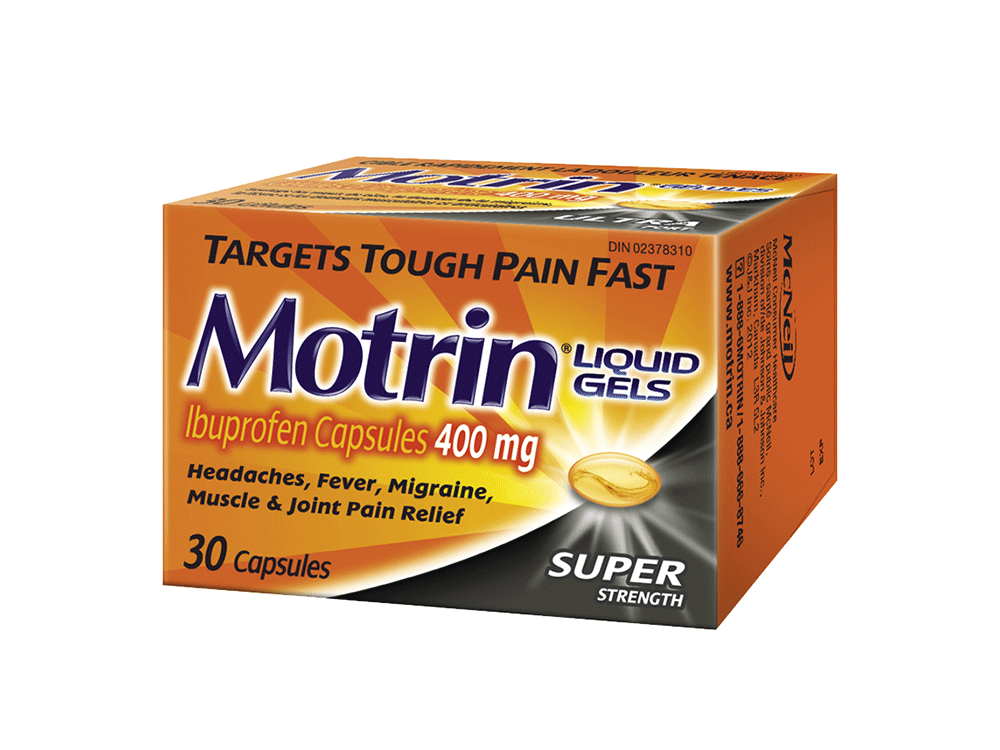
To relieve a sore throat, fever, headache, or muscle aches
Examples: Motrin Tablets; Advil Caplets; Aspirin Original Strength; Tylenol Regular Strength Tablets
How they work: Non-steroidal anti-inflammatory drugs (NSAIDs), which include ibuprofen (in Advil and Motrin) and acetylsalicylic acid (in Aspirin), work by preventing the formation of prostaglandins, the chemicals in the body that promote pain, inflammation, and fever. Acetaminophen, found in Tylenol, behaves slightly differently; it targets the part of the brain that perceives pain and controls body temperature. “Both types are equally effective,” says Kalyn, “so it’s just a matter of balancing the benefits versus the risks.”
NSAIDs will reduce symptoms for six to eight hours compared to four to six for acetaminophen, so NSAIDs can be more beneficial if you need help sleeping through the night.
Need to know: Follow package directions for dosing. “The most common adverse effect with NSAIDs is stomach discomfort, so take them with food,” says Kalyn. (Tylenol can be taken on an empty stomach.) Avoid NSAIDs if you have high blood pressure, a heart, liver or kidney condition, or stomach issues such as heartburn. NSAIDs can increase the risk of ulcers, internal bleeding and damage to the heart, liver, and kidneys. Aspirin should not be taken by those on blood thinners and has been linked to Reye’s syndrome, so it should not be given to people age 18 and under. Avoid Tylenol if you have liver or kidney disease. (Related: Learn which foods can make your headaches worse.)
Try: Motrin Liquid Gels, $20, well.ca
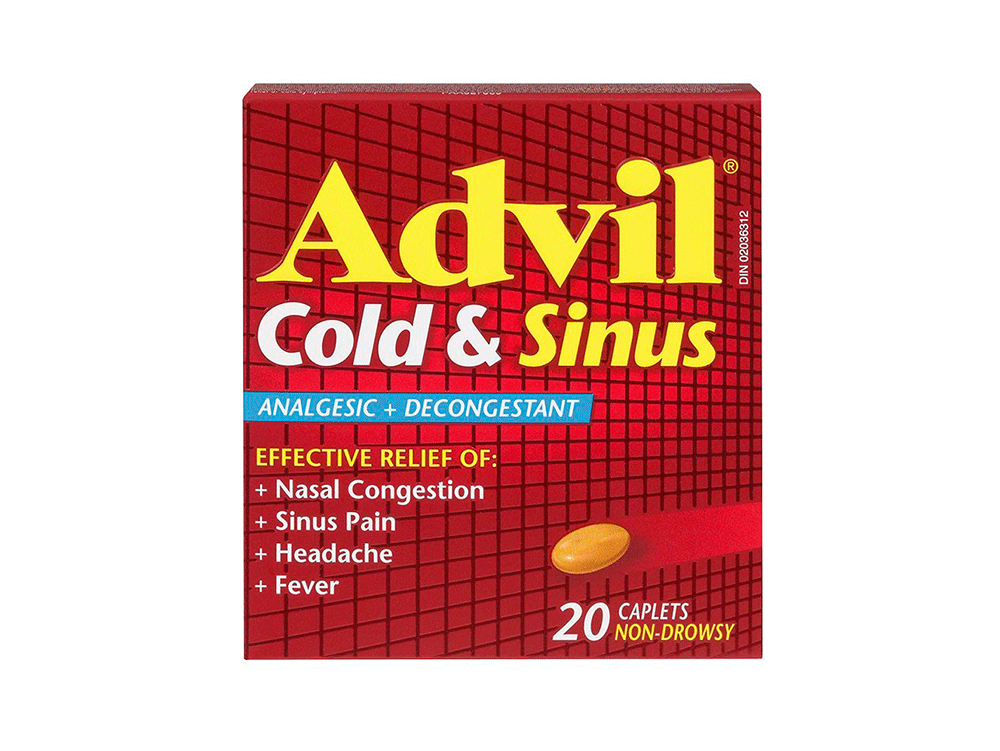
To decongest a runny or stuffy nose
Examples: Advil Cold & Sinus Liqui-Gels; Dristan 12-hr Nasal Spray; Otrivin Complete Nasal Care; Sudafed Head Cold & Sinus; Tylenol Sinus.
How they work: If you are experiencing nasal congestion on top of other cold and flu symptoms such as fever, reach for one of these. Most of these oral remedies combine acetaminophen or ibuprofen with pseudoephedrine hydrochloride, which decongests the nasal passages. “It constricts the blood vessels and shrinks the swollen mucous membranes,” says Kalyn. If you’re seeking relief for a stuffy nose alone, then nasal decongestant sprays like Dristan (which contains oxymetazoline) or Otrivin (which contains xylometazoline) can help, as these drugs work similarly to pseudoephedrine.
Need to know: Follow package directions. “Reactions to oral decongestants vary depending on the person. They can have a stimulating effect and can raise heart rate and blood pressure, which can make you feel a bit loopy,” says Kalyn. “Avoid them completely if you have a metabolic condition that is not well controlled.” In such cases, nasal sprays may be a good alternative, but since they can cause rebound congestion, don’t use them for more than five consecutive days. (Related: Here are some home remedies for a stuffy nose.)
Try: Advil Cold & Sinus, $9, well.ca
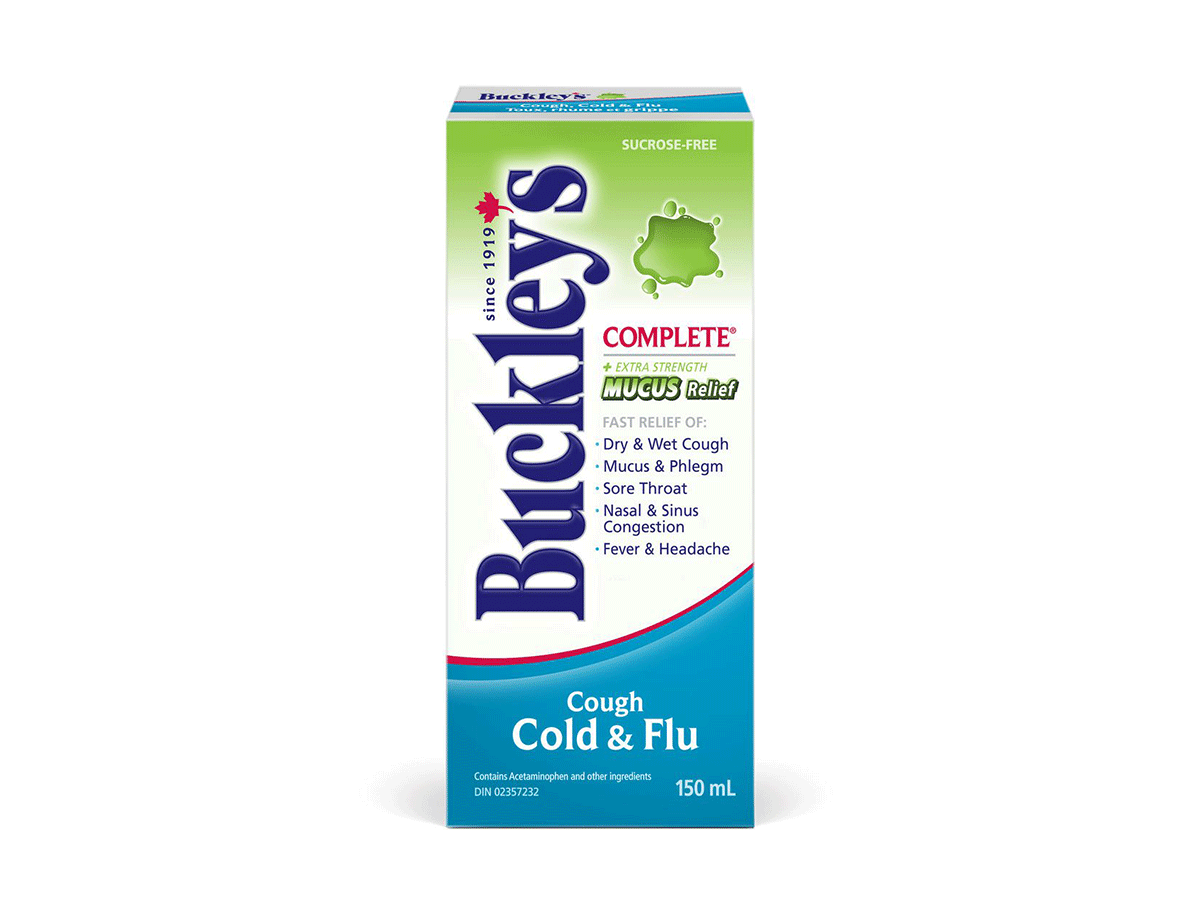
To soothe a cough
Examples: Buckley’s Complete; Balminil DM; Robitussin Cough & Chest Congestion DM; Tylenol Cough caplets; Vicks NyQuil Cough.
How they work: “Dextromethorphan is the ingredient in almost every cough suppressant,” says Kalyn. “It has a direct effect on the central nervous system and helps decrease the frequency and severity of coughing.” Balminil offers the drug in a liquid format, while Tylenol Cough combines it with acetaminophen in an oral tablet that also relieves other cold and flu symptoms. Buckley’s Complete contains acetaminophen and menthol, while Robitussin Cough & Chest contains dextromethorphan and guaifenesin, an expectorant that helps loosen mucus. Other products, such as Vicks NyQuil Cough, are marketed as nighttime cough suppressants. “They contain antihistamines, which relieve the coughing that comes from post-nasal drip, and can have a sedating effect,” Kalyn explains.
Need to know: Follow package directions for dosing. You can also safely combine dextromethorphan with NSAIDs or acetaminophen. Talk to your doctor first if you have diabetes, a heart, liver, thyroid, lung or kidney condition, glaucoma, an enlarged prostate, or an existing persistent cough. (Related: Learn when a cold stops being contagious.)
Try: Buckley’s Complete Mucus Relief Cold and Flu, $ $12, well.ca
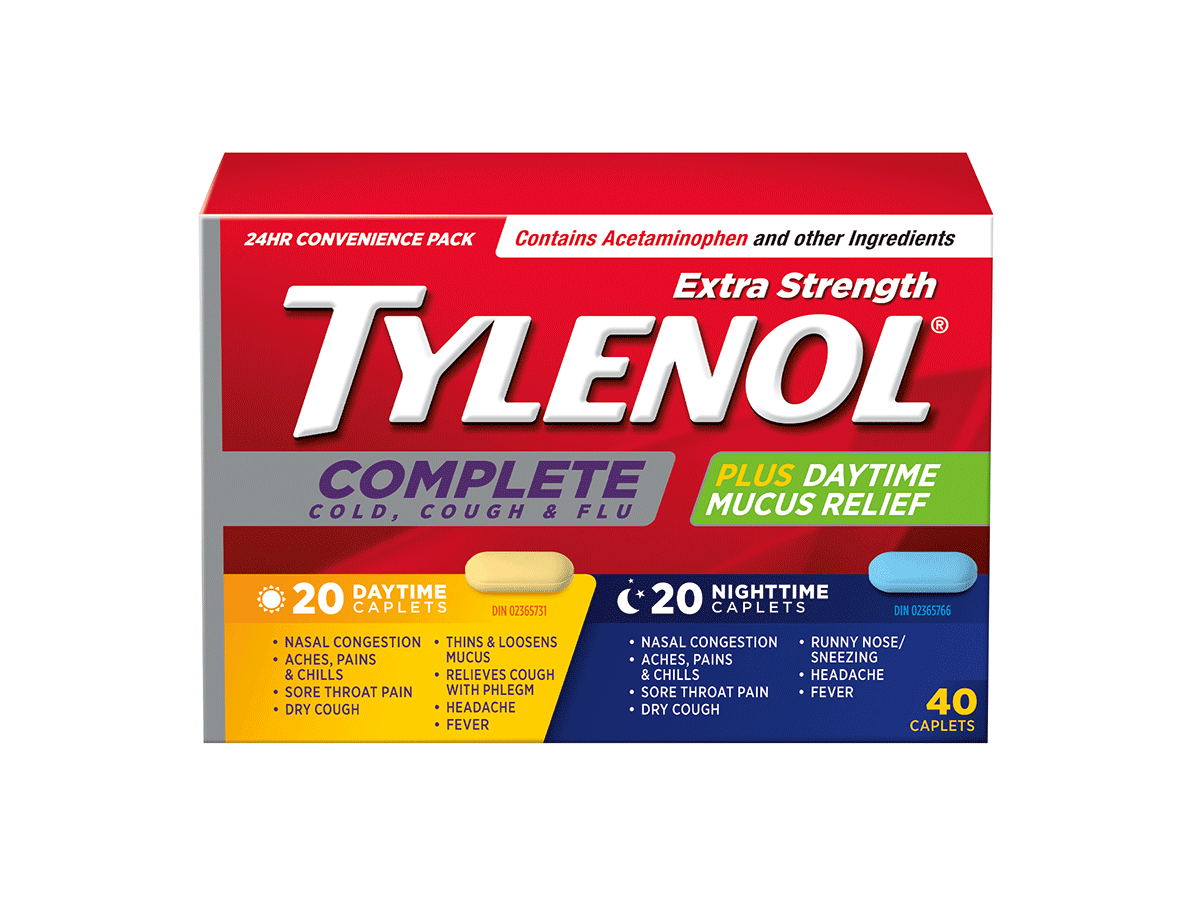
Combined remedies to treat multiple symptoms
Daytime examples: Benylin All-In-One Cold and Flu Caplets; Robitussin Total Cough, Cold & Flu; Vicks DayQuil Cold & Flu Multi Symptom Relief LiquiCaps.
Nighttime examples: Tylenol Complete Cold, Cough & Flu; Benylin All-In-One Cold and Flu Night Caplets; Vicks NyQuil Cold & Flu LiquiCaps.
How they work: If you’re suffering from severe and multiple cold and flu symptoms — fever, aches, nasal congestion, cough — then a combination remedy could be your best choice for relief. These medications combine pain- and fever-reducers with decongestants, cough suppressants, expectorants and, in the nighttime products, antihistamines. “There is almost any combination of ingredients available for any combination of symptoms,” says Kalyn. “Speak to your pharmacist to get help finding the product that’s the best match.”
Need to know: Follow package directions. Since these treatments contain several different drugs, it’s especially important to rule out any contraindications with your pharmacist and to avoid taking them with any other cold and flu medications.
If you don’t have all of the symptoms listed on the package, consider an alternative product. “You could experience unnecessary side effects if you’re taking something for a symptom that doesn’t need to be treated,” says Kalyn. Also, she says, taking multi-symptom medications along with other cold or flu products may result in double dosing.
Try: Tylenol Complete Cold, Cough and Flu Day + Night Capsules, $13, well.ca
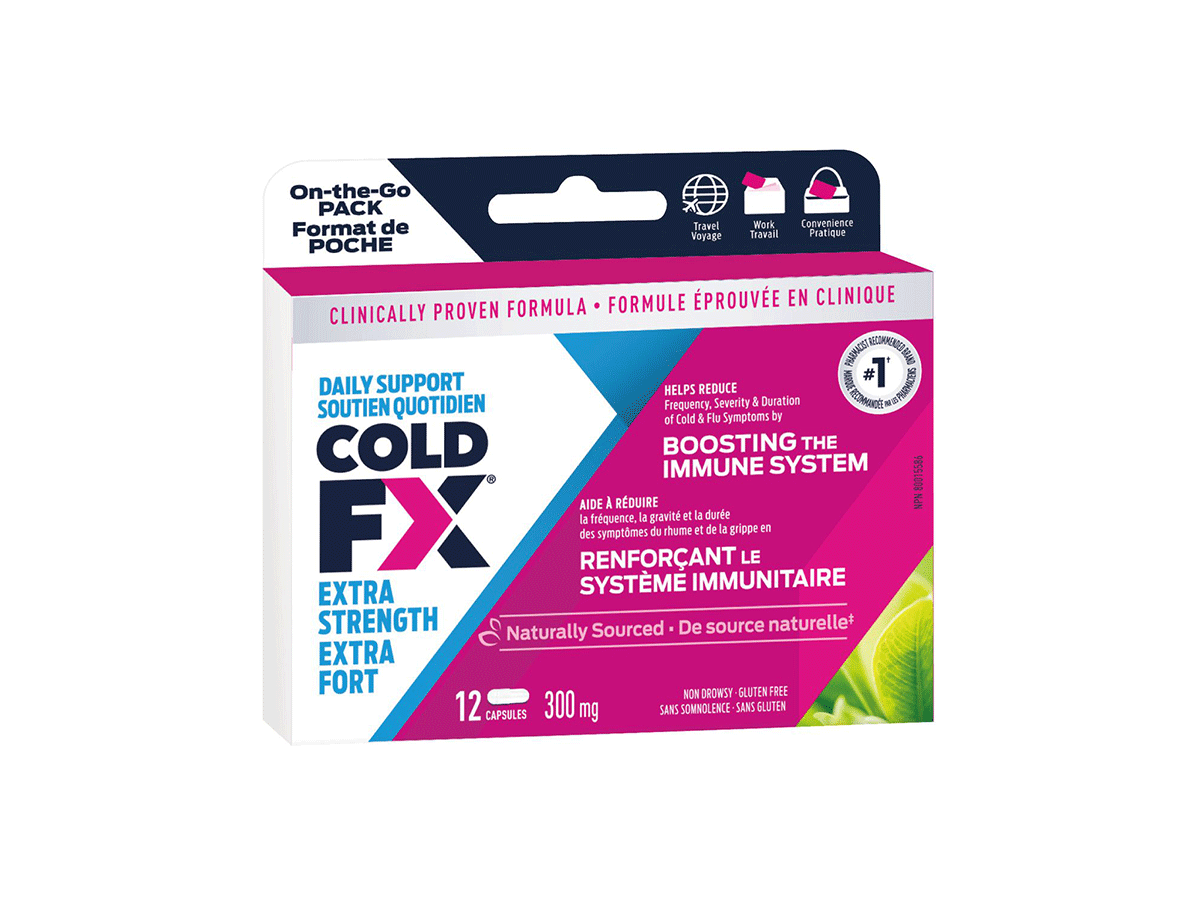
Natural remedies
Examples: Cold-Fx; A.Vogel Echinaforce Sore Throat Spray; hydraSense Congestion Relief; Jamieson FluShield; Nature’s Harmony Zinc Lozenges with Vitamin C and Echinacea; Sisu Cold & Flu Rescue with Ester-C.
How they work: “A combination of zinc and vitamin C (Nature’s Harmony) can be helpful with cold and flu symptoms if you take them as soon as you start feeling ill,” says Trevorrow. Vitamin C (in Nature’s Harmony and Sisu) also boosts immunity for a preventive effect, along with the ginseng in Cold-Fx, and echinacea in Jamieson’s FluShield and A.Vogel’s Echinaforce Sore Throat Spray. Saline irrigation systems such as hydraSense are sterile rinses that help decongest the nasal passages.
Need to know: Follow package directions. Avoid echinacea if you have arthritis, a progressive systemic disease, an autoimmune disorder, or if you are taking immunosuppressants. Cold-Fx should not be used by people with impaired liver or renal function, or by people who require blood thinners.
Try: Cold-FX Extra Strength Travel Pack, $12, walmart.ca
Next: Check out these simple habits to naturally boost your immune system.
